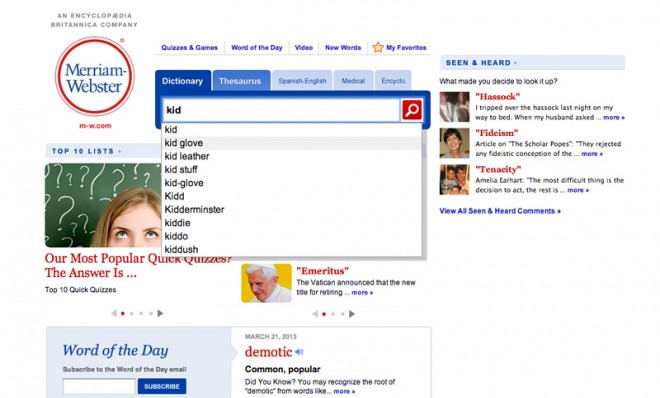What online dictionaries are learning about us
They've been tracking your word lookups for nearly two decades. And the results are striking


There was a time when our relationship with the dictionary was strictly one-way. It had the information we needed, and we took from it, giving nothing in return.
Things have changed. Now, not only can online dictionaries see what we are looking up, they can see why, and in the process, learn a lot about us. As Jennifer Howard explained in the Chronicle of Higher Education, "dictionaries have become a two-way mirror, a record not just of words' meanings but of what we want to know. Digital dictionaries read us."
Peter Sokolowksi, editor-at-large for Merriam-Webster, says that after his online dictionary began to track searches in 1996, "the first thing we noticed were these enormous spikes of interest around a big news event." During Princess Diana's funeral they saw lookups for "paparazzi" and "cortege." After Michael Jackson died they saw a spike for "emaciated."
The Week
Escape your echo chamber. Get the facts behind the news, plus analysis from multiple perspectives.

Sign up for The Week's Free Newsletters
From our morning news briefing to a weekly Good News Newsletter, get the best of The Week delivered directly to your inbox.
From our morning news briefing to a weekly Good News Newsletter, get the best of The Week delivered directly to your inbox.
The Merriam-Webster site features a section called "Trend Watch," where you can see the news reflected in lookups of "filibuster," "Emeritus" (for Pope Benedict's new title), and "capricious" (from the judge who used it to describe New York's proposed soda ban). It makes sense that people go to the dictionary when they hear unfamiliar words in the news. But they go for other reasons, too. Sokolowski says that lookups for "qi" spike during off-work hours when people indulge in the leisure pursuits of Words with Friends and Scrabble.
The site also shows a list of the most popular lookups, and not all of them are unusual or difficult words. Surprisingly, "kid" gets a lot of lookups. The site invites users to explain why they looked up a particular word, and a common reason for this lookup is revealed in comments like, "I told one of my friends I was on the way to pick up my kids. He corrected me, saying kids are considered baby goats." Hopefully, the user learned that his usage was fine and his friend was being an obnoxious twerp. (And if that sentence bothers you, I urge you to look up "hopefully.")
Not only can the dictionary tell when you're confused by the news, teased for your word choice, or taking a little word game downtime (don't worry, the site only tracks numbers, not information about your identity), it can sometimes reveal a national psychological reaction to an event. In this NPR interview, Sokolowski says that after 9/11,
we had this kind of concrete word of disaster, like "rubble" and "triage" in the first couple of days. And then words of explanation or of politics, like "terrorism" and "jingoism." And then later, you know, four, five days later, we found that people were turning to the dictionary for what I would call philosophy, words like "surreal" and "succumb," that were looked up most often. And that's really kind of interesting, that they were turning to the dictionary, following their thoughts. In other words, not the cue of a politician's word, for example, but actually, the ideas that they were sharing themselves. [NPR]
Dictionaries have always been repositories of ideas, but only of our collective ideas about what words mean. Definitions are statements about how we use words, not about what things are. Still, people seem to turn to the dictionary for answers about life's essential questions. Another of the most popular lookups is a word everyone is familiar with: "love." What do we use it to refer to? Various things, including "strong affection for another arising out of kinship or personal ties (2) : attraction based on sexual desire : affection and tenderness felt by lovers (3) : affection based on admiration, benevolence, or common interests" But what is it? How will I know when I find it? These are questions the dictionary can't answer. But now at least it will know that you are searching for it and give you a chance to explain why.
A free daily email with the biggest news stories of the day – and the best features from TheWeek.com
Arika Okrent is editor-at-large at TheWeek.com and a frequent contributor to Mental Floss. She is the author of In the Land of Invented Languages, a history of the attempt to build a better language. She holds a doctorate in linguistics and a first-level certification in Klingon. Follow her on Twitter.
-
 Trump vs. states: Who gets to regulate AI?
Trump vs. states: Who gets to regulate AI?Feature Trump launched a task force to challenge state laws on artificial intelligence, but regulation of the technology is under unclear jurisdiction
-
 Decking the halls
Decking the hallsFeature Americans’ love of holiday decorations has turned Christmas from a humble affair to a sparkly spectacle.
-
 Whiskey tariffs cause major problems for American distillers
Whiskey tariffs cause major problems for American distillersIn the Spotlight Jim Beam is the latest brand to feel the pain
